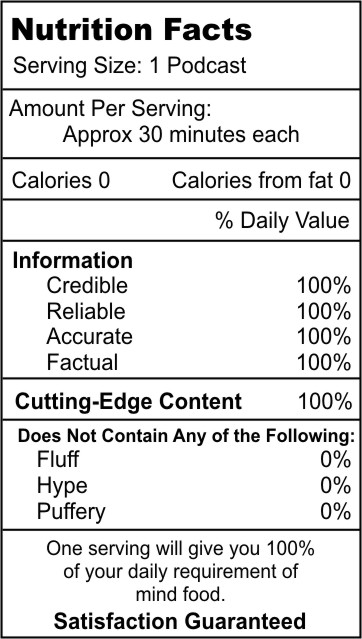Podcast: Play in new window | Download (Duration: 48:40 — 89.6MB)
Medical Bias Against Probiotics Surfaces in JAMA

Has it ever puzzled you why doctors often have a bias against the benefits of natural foods and supplements? Most of us have heard from doctors that nutritional supplements are worthless and possibly dangerous. For 25 years we have heard the often repeated myth that supplements are unregulated. How is it that these educated professionals fail to see what we see so clearly?
In this interview with Ross Pelton (the Natural Pharmacist) we are going to explore a recent piece published in the prestigious Journal of The American Medical Association (JAMA) which effectively disparages the entire probiotic industry. This is a perfect example of the collusion of the medical industry to first disparage an entire segment of the nutritional industry and then attempt to turn those products into drugs. This article discourages practitioners from recommending conventional probiotics. Doctors trust medical journals to keep them informed and when articles like this are published by JAMA, doctors assume it must be true. It is poorly placed trust.
Here is an excerpt from the article. This is the last paragraph. Here the authors call for drug like status for probiotics requiring large pharmaceutical studies. (Probiotics are already regulated as supplements. They are not drugs.) In the final sentence the authors basically state that probiotics are not good medicine. They deny that there is a good scientific basis for our confidence. This is where many doctors get advice and form their opinions.
The Probiotic Conundrum – Regulatory Confusion, Conflicting Studies, and Safety Concerns
“In summary, physicians and other health care professionals and regulatory authorities should require the same evidence of efficacy, safety, and cost-effectiveness for probiotics as are required for regulated drugs. Journals should require that meta-analyses and systematic reviews focus on large, multicenter, low-risk-of-bias studies. Regulations must be adapted to enable both manufacturers and independent investigators to test therapeutic and structure/function claims expeditiously and economically. Unless and until new data emerge, the promotion and tacit endorsement of probiotic use is not in the interests of patients, the general public, health care professionals, or the reputations of ethical probiotic manufacturers.” JAMA March 3, 2020 Volume 323, Number 9 823
WARNING: You will not be able to view the text of this JAMA article unless you are a current subscriber or want to pay for limited access. It’s interesting how locked down this article is. Even if you pay to read it, you have no rights to share it. I can’t share this with you. You cannot read it on Google Scholar or on PubMed. Articles like this are one of the main reasons your doctor thinks like he does. Pharmaceutical companies, medical schools, medical journals, and the modern medical complex are complicit in seeking to suppress that which intrudes on its domain. This seems like a perfect example. It’s one reason why many consumers have an uneasy distrust of doctors when it comes to advice on nutritional matters.
Ross Pelton has written a letter addressing this obvious hit job masquerading as objective and well-reasoned opinion. Here are the first two paragraphs:
“I am writing to express my outrage and disappointment at an article titled The Probiotic Conundrum that was published in JAMA Viewpoint on March 3, 2020. The authors of this article make absurd generalizations and slanderous statements about probiotics and the whole field of microbiome science.
The fact that JAMA would publish such a biased article that does not contain scientific references for the outlandish claims the authors make brings JAMA’s integrity into question. JAMA purports to be a peer-reviewed medical journal. However, I doubt that The Probiotic Conundrum was peer-reviewed because reviewers would catch the glaring omission of references or citations to support the claims the authors have made.” CLICK HERE for the full text pdf.
Ross then discusses the role and benefits of human probiotics. We have discussed this in-depth in previous interviews.
Google Scholar
The authors of the article there is a “paucity of high-quality data supporting the value of probiotics”. Here are the results from my Google Scholar searches. This is a hugely significant amount of scientific research.
- Probiotics = 396,000
- Probiotics since 2019 = 20,100
- Probiotics since 2019 + gut health = 16,300
- Probiotics since 2019 + irritable bowel = 5,090
If your doctor is close minded, then consider where they get their information. If your doctor is open-minded then you are fortunate for such doctors are still rare.
Ross Pelton, RPh, PhD, CCN

Ross Pelton is the Natural Pharmacist. He received his BS degree in pharmacy from the University of Wisconsin. He also has a PhD in psychology and is a certified clinical nutritionist (CCN). In October 1999, Ross was named as one of the Top 50 Most Influential Pharmacists in America by American Druggist magazine for his work in natural medicine. He is the author of ten books and numerous online health seminars. Ross is currently the scientific director for Essential Formulas. The link to his blog and personal website is http://naturalpharmacist.net.
CLICK HERE for all interviews with Ross Pelton.

Essential Formulas
Celebrating 20 Years of “Proven Probiotic Science,” Essential Formulas Incorporated (EFI) is the sole U.S. distributor of world-renowned microbiologist Dr. Iichiroh Ohhira’s award-winning probiotic supplements and skincare products. Always an innovator, EFI introduced Reg ’Activ® in 2015. Reg’Activ products contain Lactobacillus fermentum ME-3, which is a unique strain of probiotic bacteria that produces the “Master Antioxidant” glutathione. Essential Formulas is a family-owned and operated company whose mission is to market premium probiotics and other high-quality health-related products in the United States, Canada, and Mexico.
CLICK HERE for all Essential Formulas interviews.













{ 0 comments… add one now }